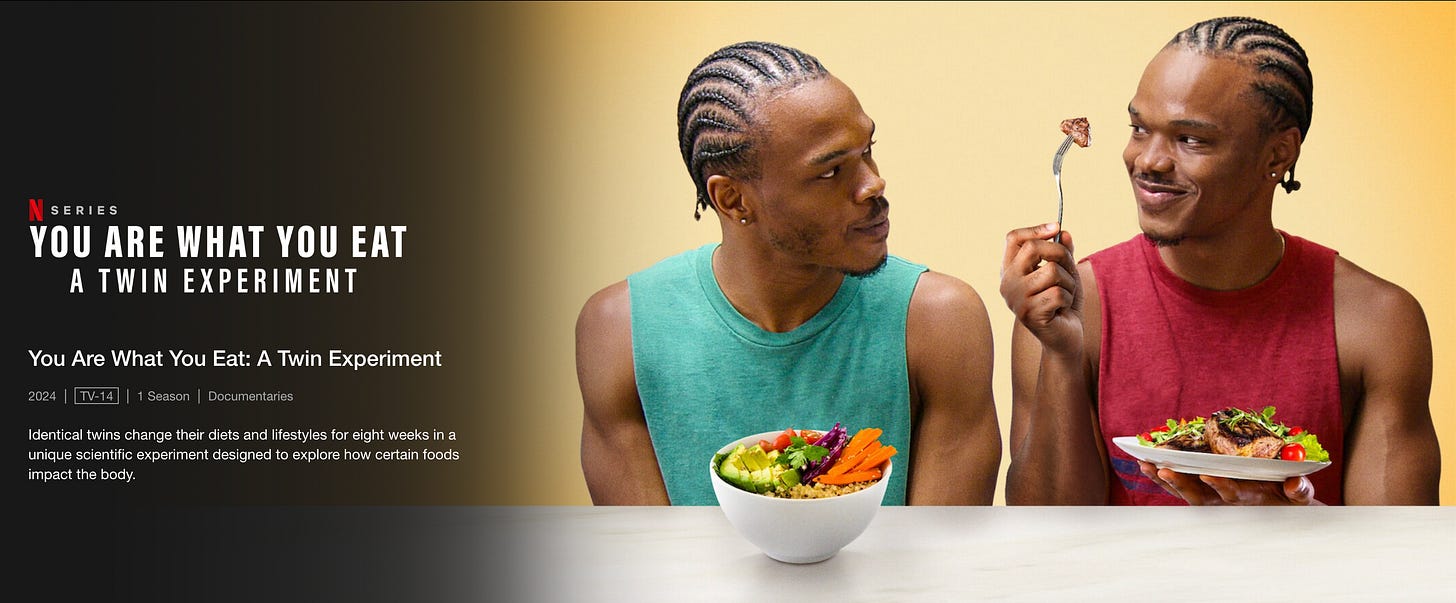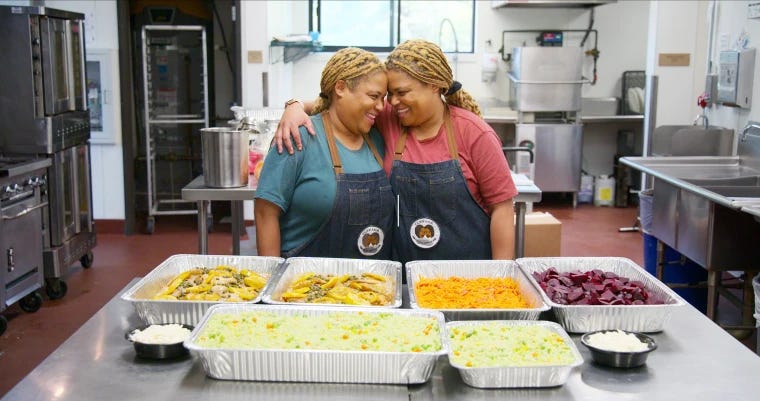Hey Broiler Heads, in case you missed the announcement yesterday, we got some brand new merch! Hop on over to our merch store and see what kind of stuff we dreamed up to make you laugh and look good as hell. Paid subscribers to The Broiler Room will get a discount code in tomorrow’s newsletter so try to wait one more day if you can. OK, now on to the rest of the newsletter!
At the end of last year, an identical twin trial out of Stanford grabbed headlines all over the world. The study compared vegan and omnivore diets over an 8-week period and found that a vegan diet improved the overall cardiovascular health of the participants. This study is the basis for the new Netflix documentary You Are What You Eat. I binged it this week to give you guys the lowdown and potentially save you hours of tv time. I somehow managed to watch all of this series and Deadloch (10/10 no notes) over the last 7 days. My couch is begging for mercy. The study and doc follows 21 sets of identical twins over the course of 8 weeks, stretched out over four hour-long episodes in the series. In each set of twins, one was randomly chosen to follow a vegan diet for 8 weeks while the other had to follow a healthy omnivore diet. There was the predictable whining from most participants assigned the vegan diet and cheers for everyone who got to follow the omnivorous plan. Some things never change. Baseline markers of health were taken at beginning, middle, and end of the study to measure the impact of diet on cardiovascular health, metabolic status, and health of their gut microbiome. The twins were all given workout regimes designed by Nimai Delgado, who appears to be the kindest trainer I’ve ever seen on TV, so that their workouts were similar as well. You get the idea.
I am not the targeted market for documentaries like this. I get it. I’ve been vegan for too long so all the talking points, facts, and figures, no matter how compelling, were largely old news. The fact that most of the world’s population is lactose intolerant, the alarmingly high amounts of chicken, beef, and dairy Americans consume, and how our obsession with beef is destroying the Amazon are all touched on. It was nice to see the ocean included in this messaging with the doc stating that 82% of global fish populations are depleted or on the brink of collapse. It went on to show some of the endless problems with farm-raised fish and how they destroy the wild populations of fish near them through the proliferation of waste and disease. I knew farm-raised fish were terrible but this section of the doc was eye-opening. Once the exception, farm-raised fish now dominates 50% of global supermarkets. Cheese was also discussed at length from the addictive properties of casomorphin to why cashews make an ideal base for nondairy cheeses. My favorite fact from the whole documentary was that cheese intake in the US has risen 45% since 1995 for one reason and one reason only: our obsession with pizza. The sooner we get a killer vegan mozzarella, the easier it will be to reverse that trend. But I’m not holding my breath.
The twins followed by the documentary crew were fun to watch, particularly sister-sets Pam and Wendy and Carolyn and Rosalyn. I’d watch a whole show just about these four ladies because they were a crack up and endlessly charming every time they were on the screen. They were also the most fluent in cooking, with Pam and Wendy running a catering company. I think this deep connection with food helped the sisters be more curious about changing their diets than some of the male sets of twins who didn’t have as much food fluency, like John and Jevon. But instead of focusing primarily on the twins and their ups and downs over the 8 weeks, the documentary was all over the place. The study itself was not complicated enough to fill every hour-long episode, so the audience is shown how destructive the standard American diet is on our health, the planet, and animals across all the episodes. Their position is clear long before the conclusion of the study is reached: go vegan. This shouldn’t bother me but damnit, it does.
The Stanford study was funded by the Vogt Foundation which in turn produced this documentary as well as the 2018 Netflix documentary The Game Changers. Kyle Vogt, predictably a young tech millionaire, is the man funding all this work. A vegan himself, he is clearly passionate about the environment, diet, and health of the oceans, despite spending the last few years working on self-driving cars at GM. I think it’s great that he uses his money to advocate for the things he cares about but I wish he’d take his thumb off the scale a little. As Dr. Michael Gregor (who I love) points out in the documentary, we have a mountain of studies that show eating a plant-based diet can have huge positive outcomes for people particularly when it comes to cardiovascular health and cognitive decline. An 8-week study of such a small sample of people wasn’t designed to make any breakthroughs or discover anything amazing, it was just for the documentary. It’s play science.
If you love food and nature documentaries, You Are What You Eat is more of what you’re used to but easy to watch. It’s so much better than the baffling Trees and Other Entanglements on HBO which also just came out. Skip that shit for sure. You Are What You Eat features endless cameos of some of my favorite people in the plant-based space like Drs. Ayesha & Dean Sherzai, Chard Sarno, Dr. Michael Gregor, and Miyoko Schinner who all do a great job talking about their passions for food and health. It was great to see so many familiar faces because their fantastic work deserves as many eyes as possible. There is minimal animal mistreatment/abuse featured in the doc so it would be good to watch if you have someone in your life who might benefit from hearing some of these facts for the first time but hate the gory stuff that is so often included in these vegan forward series. If you’re looking for a compelling, thought-provoking documentary based on innovative science, keep looking. You Are What You Eat is for people new to food documentaries and veganism who want to learn more without being shamed or buried under tons of data. It’s light with just enough hard-hitting facts to change a few hearts and minds.









Hey y'all - that's Dr. GREGER, please!! (Says I, who has loved him since the days when his vids opened with the parting of cheesy orange curtains.)
Thanks for the background. I watched it also and while not a vegan, definitely felt it was trying too hard to convince me to be one. Eating less meat, seafood and dairy is always good.